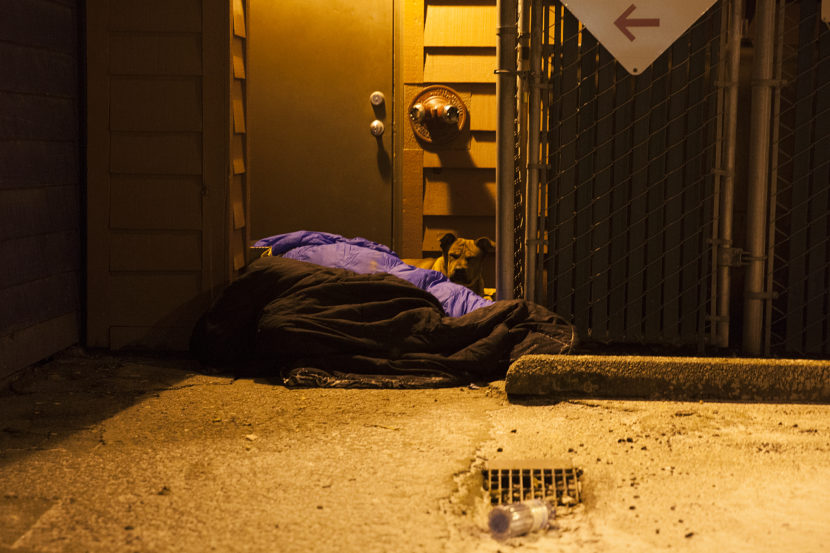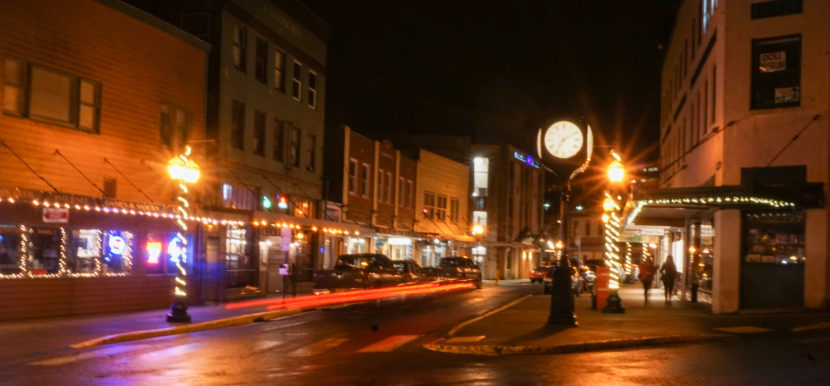
Local policymakers are considering giving police the power to ticket homeless people that sleep outside in downtown Juneau. A statewide count conducted a year ago found 50 people living without shelter in the community, and another 160 in shelters and transitional housing.
I rode along with a Juneau police officer recently to see how the police deal with the community’s most visible residents right now.
It’s an hour before dawn and Juneau Police Officer Alexander Smith is making his usual rounds. In front of the downtown cruise ship terminals, a man is tucked deep into a sleeping bag against a building to keep out of the rain. It’s a similar scene on South Franklin Street. A couple is covered in blankets in front of a shuttered storefront. Officer Smith knows most of these people’s names. And they know his. He radios in to check for arrest warrants. But first, he confiscates an open can of malt liquor, pours it out and moves on.
Homelessness in downtown Juneau has became an increasingly visible issue. Merchants have complained to the police department, but downtown beat officers like Smith say their hands are tied.
“Doorways like these easements here are private property. So it’s the responsibility of the business owner to contact us if there’s trespassing issues, vandalism and that kind of thing,” Smith said. “So if we see someone sleeping in the doorway we can contact them and make sure they’re alive and breathing, but we don’t have any legal authority to remove somebody from the doorway simply for them standing there.”
But a proposed anti-camping ordinance sets out to change that. If adopted, the ordinance would let officers ticket people camping on private property within the downtown core.
Juneau’s police chief has come out in support of the initiative, though Officer Smith admits enforcement with tickets could be challenging.
“It kind of goes along with the open container tickets and that kind of thing, where a lot times the people who have been here long enough they don’t care,” Smith said. “They’ll take 20 tickets and be like, ‘Whatever.’ Now whether or not a new citation will actually change your behavior is debatable. But it’s one of those things that hopefully will be an incentive.”
The Juneau Police Department later clarified that under the ordinance anyone caught camping downtown who refuses to move could be arrested for disorderly conduct – a jailable offense.
Joshua Donald Smith (no relation) found himself sleeping outdoors. The 45-year-old says he’s dealing with substance abuse issues, and that he’s aware why some downtown merchants are upset.
“I understand the businesses. A lot of the homeless people kind of wreck it for other folks by defecating on the street, throwing their trash everywhere, just basic disrespect for the community,” he said. “But there’s some of them on the other side that go sweep up — voluntarily.”
Juneau has homeless shelters including the 40-bed Glory Hole downtown. But the shelter won’t take drunk people — for understandable reasons. And that, Joshua Smith says, doesn’t work for some people struggling with addiction and in crisis.
“This guy lost his mother the other day,” he recalled. “He had a bad night and he was drinking and wasn’t dealing with his emotions and he got kicked out for six months the next day. The guy lost his mom and now he’s in the rain. It’s a sad situation. I don’t want to say let’s make it easy for these people get drunk and wasted all the time, but there’s got to be a happy medium where they can have a roof.”
In the summer the city-run Thane campground provides low-cost camping that acts as transitional housing. But it’s in an avalanche zone and unsafe in the winter. That leaves homeless people without a legal place to camp on public or private property.
At the Glory Hole, Juneau’s 40-bed downtown shelter, it’s just after sun up and about two dozen people are drinking hot coffee and tea. Some spent the night here others have just come in from the cold. Steven Lythgoe, 43, says he’s been homeless on and off for about seven years. He says he’s working to his driving license reinstated and getting back to work but he’s running up against the shelter’s 90-day limit and isn’t where he’ll go.
“There are some services and they take quite a while to actually get done. There is quite an extensive waiting list, you’ll be waiting up to six months in some cases and you can’t stay here for that long,” Lythgoe said. “And that’s what it makes it really hard. And so you’re having to try and find somewhere to go. And they do, I think, they need to make a place where people can put tents and be safe in their tent.”

Juneau’s proposed ordinance isn’t without controversy. In a letter Thursday, four Juneau-based Alaska Native institutions urged the Assembly to abandon the proposal. The city attorney’s office has cautioned that federal courts have struck down city laws that effectively criminalize homelessness. That’s why the ordinance targets illegal camping rather than just sleeping or vaguely defined loitering or vagrancy.
Officer Smith says that the anti-camping ordinance would allow him to focus on the type of sleepers who are attracting the most complaints but not everyone sleeping downtown.
“It probably won’t have too much of an actual impact on people who are just kinda slumped over in the doors,” the officer said. “Because, you know, if they don’t have any money or any means to provide for themselves, giving them a ticket or kicking them to the next doorway is not going to change a whole lot. But for people that are building legitimate tents and camps it might create an incentive for them not to do that.”
That may or may not satisfy downtown merchants but it will allow police to take a more aggressive approach in dealing with some of Juneau’s most vulnerable residents.
The public hearing — and a possible vote — will be held Jan. 23 in the Juneau Assembly’s chambers.
Clarification: This story has been updated to reflect that under the proposed ordinance, failure to comply with a police order to move on could also lead to a criminal charge.